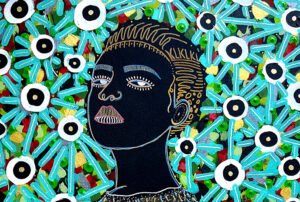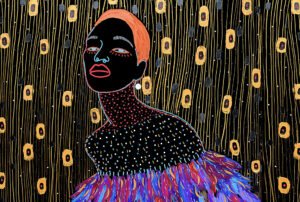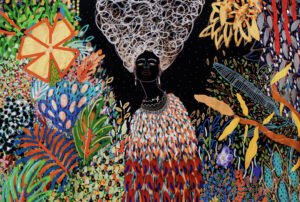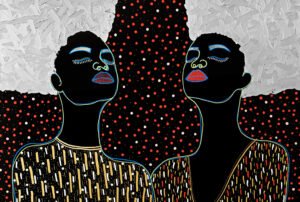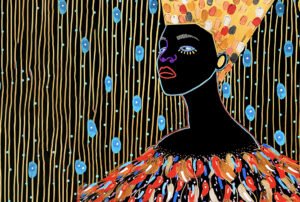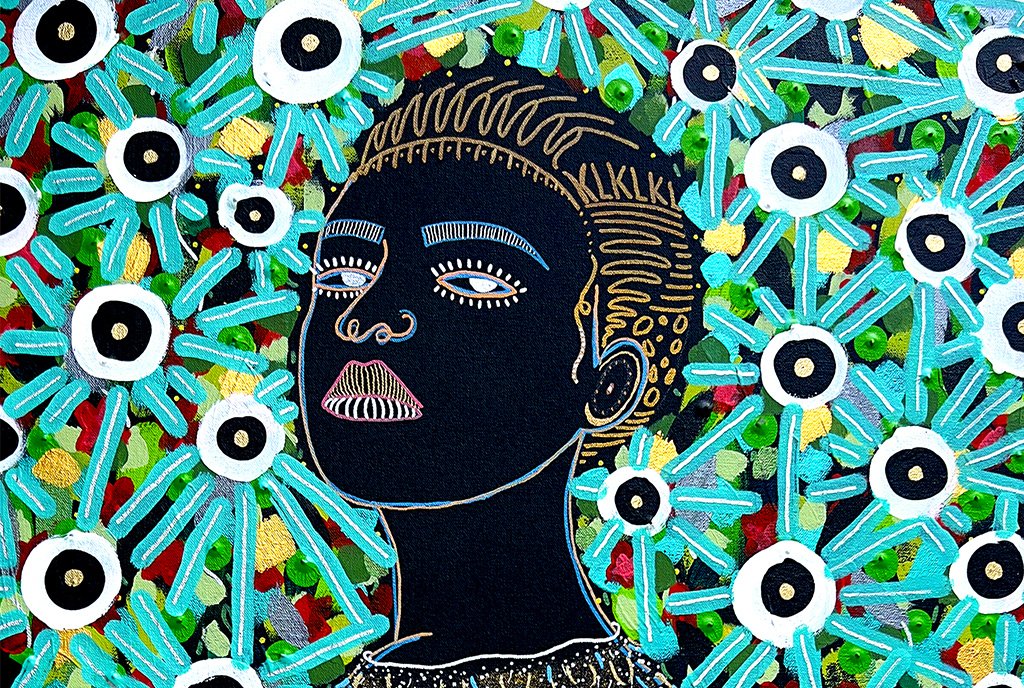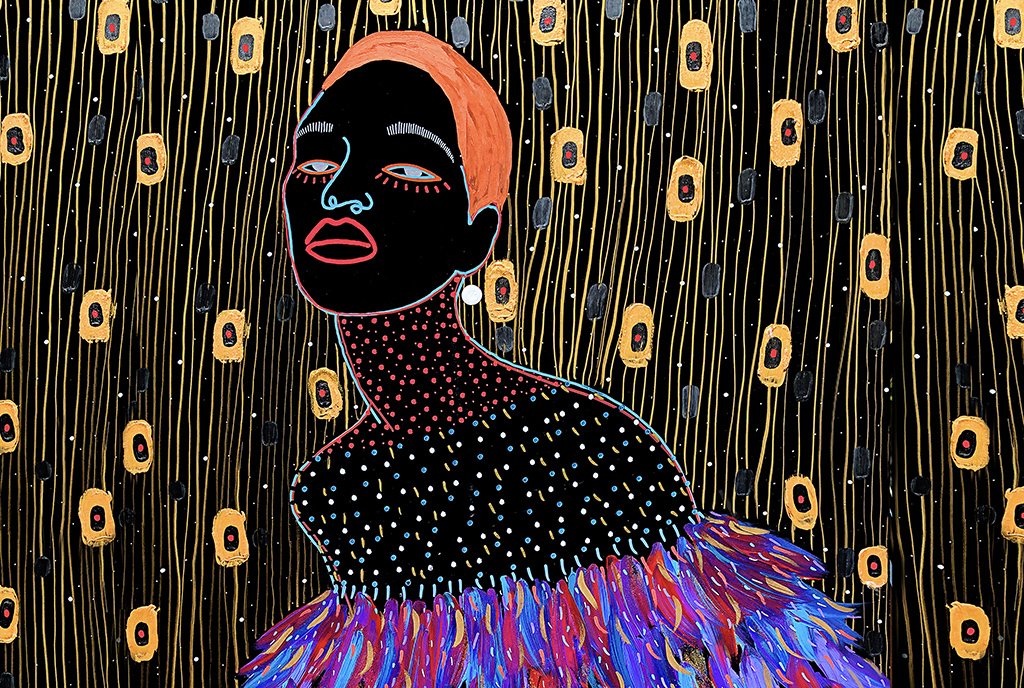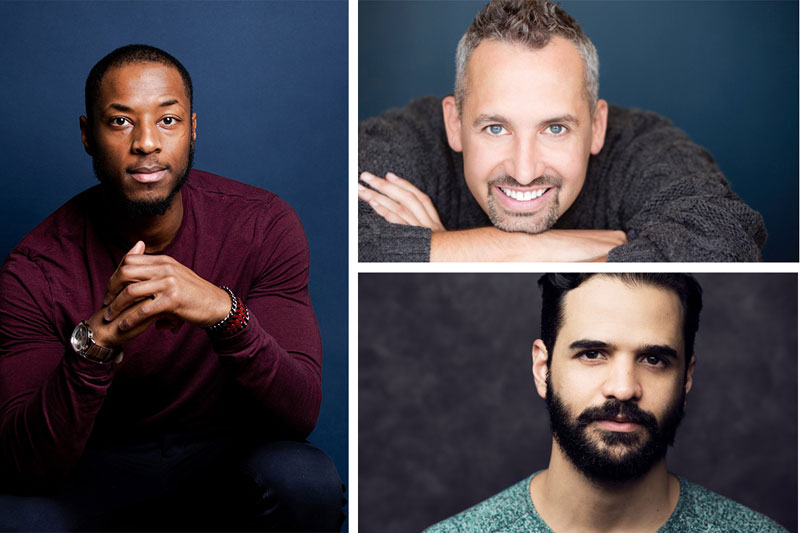
Amy Costello: Welcome to Tiny Spark, a podcast of the Nonprofit Quarterly. We focus on what is required to build a more just society—in matters of race, health, the environment, and the economy. I’m Amy Costello.
Hiram Delgado: Every actor dreams to be on a Broadway stage. That’s like the highest you could get, in my opinion. And, being a Hispanic man, I was raised in Puerto Rico. English is not my first language. Being given the opportunity, to play a Hispanic character and to be surrounded by such amazing and creative people, it’s the sort of thing that you dream of, honestly.
Costello: And dreams finally came true for actor and writer Hiram Delgado. He was working in a cafe in Bushwick, New York to pay his bills, when his agent called. He’d been cast in the drama Take Me Out. It was going to be Delgado’s debut on Broadway. The show was set to open for previews in April last year.
Delgado: I can’t describe to you the feeling of, like, having your passion be the thing that gets you out of a day job that you don’t really like. It’s the most amazing feeling in the world. It was just like a big high, obviously. I think that Broadway is great, yeah, but also what is greater is that I can pay my bills and buy my groceries, and I can do it just by rehearsing and putting on a show and playing with people. That’s what gets me excited about it, is that I can make a living off of this.
Costello: But then, COVID hit. And Hiram’s rehearsals for Take Me Out suddenly came to a stop. At the time, he didn’t grasp the enormity of the virus…
Delgado: Yeah, we thought we were going to come back the same day, that next day or a couple of days after. But that wasn’t the case, yeah.
Costello: …and the impact COVID would have on his beloved theater community across New York.
Delgado: It’s hard. Right now, I know a lot of my friends that had to leave, because they were just like, I can’t afford to live here if I’m not doing what I’m supposed to be doing. And it’s been really, really sad to kind of see the impact that this has had on every industry, but especially on artists.
Costello: It’s been 18 months since the world went into lockdown and social isolation. Slowly, some venues are beginning to open again, including Broadway. Here’s theatre star Lin-Manuel Miranda at the stage door on the night of Hamilton’s reopening…
Lin-Manuel Miranda: Hi, everybody! Hello, New York. Broadway is back! Thank you for supporting live theatre. It has been a hard year and a half…
Costello: Broadway is finally back, and so in this podcast, we’re speaking to actors, writers, and directors with ties to the New York theater scene to learn how the pandemic affected them, and to hear about the surprising ways that the mandatory break has changed their relationships with the New York theater scene. And we’ll hear a little bit about their demands for the industry in the years ahead.
Ben Cameron: Well, the theater industry was the single most decimated industry on the planet.
Costello: That’s how Ben Cameron, who describes himself as “your Broadway buddy,” sums up the industry he so loves. When theaters went dark on March 12th, 2020, the Wall Street Journal estimated that the hit to Broadway ticket revenue alone would be $100 million. Since then, at least 15 Broadway shows have either closed or been postponed indefinitely.
Cameron: Actors have been hard hit in the pocketbook, and we have to remember this isn’t just actors; this is actors, this is stagehands, this is orchestra. This is wardrobe, props, hair, so many departments, ticket-takers, ushers, box office. These are people who have been without any source of income at all for so, so long, outside of whatever they tried to create out of thin air during the pandemic.
Costello: And it’s not just a financial toll, of course. Closing Broadway, in some ways, shuttered the souls of the men, women, and kids who had been living out their life dreams on its stages. Ben still remembers getting his big break at just 19 years old in the Broadway production of Footloose.
Cameron: It was all so exciting and kind of wild to achieve your one life’s dream before you’re in your 20s.
Costello: He went on to perform in Aida and Wicked, and now, in his 40s, he’s the creator and host of a Broadway concert series, and he hosts live events and podcasts, too. Even so, Ben says it’s been a tough year and a half. Yet much of what was created out of thin air during the pandemic amazed Ben, as artists created virtual spaces to perform in. But this return to live theater? Well, for Ben, there’s nothing like it. It provides something electric—for actors, and their audiences, too.
Cameron: There’s really no comparison or replacement, certainly, for the energy that exists between a live audience and the actors up on stage. So, coming back is huge, just for the energy. And what theater does for people’s souls on both sides of that orchestra pit is massive. It’s amazing to see all these brilliant minds come back to work, because Broadway is such a very, very special place. So, I’m excited. I’m excited to be back in the theater. I’m excited to see actors doing what they do again. Somebody’s life is always changed when they sit in the house of a Broadway show. It’s somebody’s first time in the theater, it’s somebody’s last, in every show. And some kid is going to be the kid that we all were, who’s going to see this show and it’s going to change their lives—which is why I think, moving forward, representation is so vital.
Costello: Ben Cameron’s right, but representation in the theater still has a way to go. An annual study by a group of actors—the Asian American Performers Action Coalition—found that over 60 percent of all roles on New York City stages went to white actors, a rate that is double the population of white people in New York City. And in 2021, Ben says everyone loses by this exclusion.
Cameron: If you look up on stage and you say, “Well, this is a white person’s sport,” or “this is a skinny person’s sport,” or “this is a man’s sport” that I’m looking at, this says, “I don’t see me up there.” Representation, and kind of opening the doors to these conversations, allows that, because there are so many brilliant storytellers out there. And without knowing that something is for them, that Broadway is for them, for everybody, we may miss out on some of those incredible voices that have something to say, or something to bring. And I think it goes deeper from even putting people on stage. It’s providing access to the theater to communities that maybe don’t have access to it, and they can experience those life-changing emotions and feelings and awakenings that I’m talking about. But representation on the stage is certainly a start.
Costello: And as you look at Broadway today, is it for everyone?
Cameron: You know, that’s the conversation that has really been brought up. Broadway certainly should be for everyone. I think, theater…I found as an othered person in the way I grew up, in Utah of all places, and moving to New York City as a gay man, I understand just how hard it can be to be othered where you’re from, and theater, I have found, has been a place where so many people are able to come and go, “Oh, I belong here.” Theater has traditionally, whether we’ve known it or not or dared to look at it, with ticket prices—Broadway shows are very, very expensive to attend—has been fairly exclusive. But theater absolutely should be for everyone. And I am seeing some changes in that moving forward. But theater has been far too exclusive for far too long.
Costello: According to the ticket platform SeatGeek, the average price of a ticket to a Broadway show is $189, which is out of reach for most audiences. And Broadway can feel out of reach for actors, too. Here’s Hiram Delgado again.
Delgado: I’m from Puerto Rico. I moved to New York when I was 28 years old, so I’ve never acted in English before moving here. I used to do everything in Spanish. So, when I moved here, I went to grad school at NYU. That was a great experience, just because…so it was great and it wasn’t, just because you get to play everything. Right? You get to do Shakespeare. You get to do Chekhov. You get to do Oscar Wilde. It’s just very varied. So I thought, well, great, this is what it will be when I graduate. Like, you know, these opportunities. I’ll be able to do all this work, you know? And it didn’t take me a long time to realize, like, not quite, you know? This industry—and when I say industry, I mean all mediums; I include film, TV, theater. I feel like if you don’t know who you are.… Identity is extremely important, just as human beings, but as an artist, if you don’t, if you struggle with it, you see that. I feel like you can see that in someone’s art, you know, and I still struggle with that.
Costello: Zoey Martinson is an alum of the same prestigious graduate program Delgado attended at NYU. As a writer on season two of the HBO Max show, Betty, she’s had similar experiences as a writer and director. Zoey recognized that her talents were received more openly in TV, film, and even some kinds of theater, but not on Broadway.
Zoey Martinson: I was never like, oh my gosh, one day I will have made it if I direct, or I’m a writer, or I’m on Broadway, right? That was different when I went to school because that was kind of being funneled in the education as the pinnacle. And I’m thinking, okay, that’s…I love it, I love seeing these shows, but they are really not what I create. And they’re not oftentimes as politically charged as the work that I’m interested in, challenging audiences in a way that I do. So, I was like a super-appreciative theater nerd from the outside of it.
Costello: But why did Zoey, who grew up in and out of New York, have this sense of feeling “outside” of Broadway rather than feeling a part of it, a place she could actually aspire to herself? Well, it started when she would sit in the audience and look up on stage.
Sign up for our free newsletters
Subscribe to NPQ's newsletters to have our top stories delivered directly to your inbox.
By signing up, you agree to our privacy policy and terms of use, and to receive messages from NPQ and our partners.
Martinson: That lack of representation, and the lack of seeing yourself, seeing a career for you in it, doesn’t make you want to create for it. Broadway was never my end goal. I think also because I loved it, and I saw shows, and it was like so impactful, and I got goosebumps watching them, but I just didn’t see a space for me to have a career in it. And so as much as I adored it and appreciated it, I was never running towards it. Also, the work that I do, and I just never saw it kind of reflect like the nerdy passion things that I get into. It’s just not the work that I see done on Broadway, just flat out. So, Broadway was never something in my sights.
Costello: So, when the pandemic happened, which also coincided with Zoey becoming a mom, she came to appreciate the break that COVID was providing her career, and this pressure she had felt to push her work into spaces that were not necessarily interested in what she had to offer.
Martinson: I actually had kind of become a little disenchanted by New York theatre’s community and the producing of theater. Not the art itself, and not the people creating it, but just the producing of it. What stories from Black artists or artists of color were given, were allowed to be told versus the ones that weren’t, so I think my hope is that, stepping away from it as a community, that hopefully people had time to maybe reflect and maybe that part of it could become a little less toxic, and we could all step back into it with a breath and a reentry of why theater is important just to culture itself, because sometimes I think in the commerce of it, that can get lost. And that’s a shame.
Costello: Hiram Delgado told us that he’s had a similar revelation to Zoey’s. While COVID brought his Broadway debut to a screeching halt, in time, he realized that this break was providing an opportunity for him to take a breath and reevaluate his entire career. Turns out, this period of lockdowns, closures, and isolation has also been a time of great expansion and doubling down on his authentic self.
Delgado: It’s made me aware of, actually, the type of work I want to do, and the type of people that I want to work with, which is huge for me, because we’re always…I feel like, me, as an actor, I say yes to kind of anything that comes my way, just because it’s so hard to get. But now, because this experience has been very harsh, I find myself being like, time is limited for all of us, so why not focus on the work that I actually want to do, and the people that I want to work with, and institutions that I respect and want to go after and dream of collaborating with, instead of just saying yes because this is a gig? And I say that cautiously, because I’m aware of how hard it is to book stuff and to have the opportunity for people to seek you out.
COVID has been this really weird mix of just, like, terror, but also sometimes I feel very grounded in that experience. So, I’m very grateful that I have a theater company that I love that grew out of COVID, like honestly just developed in itself because we had that need, you know? We had that need to kind of create. So, that came out of that. And I’m just extremely grateful for every little opportunity that I get. I’ve been doing a great deal of writing. I’ve been doing a great deal of directing. So, having the time to do those things, honestly, is also sort of like a blessing.
Costello: Many people have discovered hidden and unexpected blessings amidst the myriad hardships that COVID has wrought. Back in 2018, Doron JéPaul Mitchell was part of the original cast of Aaron Sorkin’s Broadway adaptation of To Kill a Mockingbird. He gave his performance 400 times, and Doron gave his final bow and left the show. The following year, the pandemic hit. And, like Hiram, he discovered a lot about himself, and he liked the person he found.
Doron JéPaul Mitchell: Honestly, the hamster wheel’s gone, to put it very bluntly. You know, as artists, we often think of life as like, especially as an actor in a world that’s so much about, “someone tell me I’m pretty,” “someone tell me I’m good,” “someone tell me I’m worthy of the thing.” And you go through audition after audition, and you move in that kind of lifestyle. It can be very…I always say the pandemic was the universe telling everyone to go to their room and think about what they’ve done. And while we’ve been in this season, it’s gifted—at least for me, it’s gifted me the opportunity to truly reflect on the why I wanted to do this in the first place.
I initially started out as an applied mathematics music composition major who wanted to teach high school. And acting was one of those things where my story’s similar to so many—you fall into it, and then you blink, and next thing you know, you’re in it at a very high level. And, you know, if you’re not careful, you’ll lose sight of the reason you wanted to do it in the first place was because as a young Black man, the opportunity for other people to see a diversity of my body and a diversity of our diaspora, like, in the way that I carry myself. So that for me was crucial to why I chose to be an actor, because I always said to people, at the end of the day, if I can get one young brother to see a guy who has no problem playing football, playing basketball, loving sports, like, fishing, hunting, hiking, but also is willing to want to cry and talk about his feelings. Or if I can show someone what it looks like to have intimacy amongst men. You know, my goal in life is to destroy hypermasculinity through my Black joy and expression. And it feels super daunting, but I feel like for me as an artist, that’s always been at the center, and the pandemic really gave me an opportunity to rethink about that. What are the projects that I’m doing? What are the auditions that I’m taking? What is the creative team that I surround myself with? For the pandemic, it really gave everyone a reminder that, you know, we’re still playing make-believe. Not that we’re not heroes or anything, but there are higher stakes than memorizing lines and performing eight shows a week. And I think that it’s now reflected in, I can approach this craft as but a tool, as opposed to something that feels that it is without a level of weight. A burden. It feels more like this is a means to a greater end for connecting people, as opposed to a burden that, as an artist, it’s like my job to do blah-blah-blah-blah-blah-blah-blah.
Costello: I read the piece that you wrote for the alumni magazine at Colorado College, entitled “My Mockingbird.” You were reflecting on your experience in the cast of To Kill a Mockingbird on Broadway, and you said, “The countless evenings hearing terms used to degrade my people, myself, the doubt that arises night after night, wondering how many, if any, messages are being taken away from such a commonly known piece of literature.” And then you go on to say, “Curtain call has become a ritual of my eyes desperately searching for the glimmers of melanin among an overwhelming sea of ivory.” And, you know, you did ultimately decide to leave that production, and you talked to me just now about part of what, or maybe the most important thing that drove you to want to act. And yet there you were, night after night, performing an incredibly difficult performance about race and racism. And you’re there every night, though, looking out at an overwhelmingly white crowd of faces. And I’m curious if you’d be willing to talk to me a little bit more about what that was like for you, because you had this drive on the one hand, and yet, were you reaching the audience you even wanted to reach? I’m curious about that.
Mitchell: Man, you asked, you’re asking the right questions, Amy. Thank you for asking that, and thank you for also reading that piece, and just hearing those words back from you. You know, To Kill a Mockingbird was the single greatest blessing that I could have received at that time, and the most daunting challenge that I will ever undergo as an artist. And one of the things that I often told people is, “To Kill a Mockingbird is not my favorite book. I don’t love this book at all.” Like, it’s a book about the lack of agency for someone who looks like me, in a time years ago that feels like it was yesterday. And I do a play where people call me the n-word, or say the n-word around me, or use paraphernalia that is racially charging for three hours a night every night for a sold-out crowd of roughly 96 percent of the Caucasian race. But I followed that with saying, and yet it’s in me sitting in my silence on that stage, and you having the opportunity to choose to either acknowledge me or discredit me for whatever else is shining on the stage, or whatever story or thing you want to take away from it, I think is a part of the learning curve. And, for me—especially as a young artist—I’ll be honest, there are places and people that, you know, you talk to them all the time and they’re like, “oh, you’re an actor, that’s cute, blah blah blah.” And then the second you reference that you were in To Kill a Mockingbird, you know, they treat you completely different. And it’s a currency, and yet in many ways, I had to ask myself every night, is the opportunity to now be in a room that I otherwise wouldn’t have been worth the sense of potential peace that I would be giving up? And I think that that’s a question that I really didn’t give my…I didn’t really have an opportunity to ask myself until after I left the show.
But at the same time, you know, leadership flows from the head down. And I think that that’s where I often look at this feature of Broadway and I ask more questions to writers and producers than I do to the actor who’s trying to get health insurance. Because a lot of times it’s very easy to blame an actor for, oh, of course you did that play, that offensive play, but at the end of the day, if I told you that they need those six weeks in order to have health insurance, and we have a system that unfortunately doesn’t support them in that regards. I would look better to the writer, and I say to the writer: “Hey, in that scene, is it necessary for that character to be assaulted the way they’re assaulted, outside of shock value?” And if the answer is “yes,” can you explain that? You know, as a producer, I think that that’s where our great producers that are coming up, and the great producers that are currently on Broadway, need to continue to ask themselves those questions, so that as we transition out hopefully of this COVID era, this era of reflection and building, have we actually laid foundations for real change, or are we just running to get back to the Disneyfication of Broadway? And if the answer is that we’re running to get back to that, we want to ask ourselves why. Why is that comfort so imperative and so important to us at the detriment of what we all like to say we’re doing art for, which is illuminating and enlightening culture around us?
So, I’m inspired by the future. But I do think that in order for the future to actually come to fruition, we all have to be willing to take more pauses, and I think the next generation of little Black boys and girls who look at me and say, wow, he did it all at the same time and at a pace that also valued community, valued not needing to be in a rush, but more importantly valued expression, because I think that when we truly express our ourselves and make ourselves open to critique, I think we are inadvertently closer to joy, you know?
Costello: Zoey Martinson says that Broadway needs to recognize, embrace, and support this next generation for the art form to survive and, ideally, thrive.
Martinson: Unless you create space for this new America, and if it doesn’t grow and it doesn’t evolve, and it doesn’t allow for its art to evolve, it will just be an artifact of something that you create for. And that’s kind of sad. And I think in allowing for new voices and new perspectives, allow for an evolution in art, because you have systemically kept out a whole group of Americans, or even just people. And that just comes from, you know, our racial dynamics in hiring practices, and just opportunity in this country and privilege, you know, and access. So, it isn’t just like, oh, here you people of color go. It’s like, oh, here, you people of color, here’s the support. And now let’s—let’s go.
Costello: And Zoey hopes this happens because as a society, we need this art form, and the bonds built in the theater are essential, especially in our increasingly polarized society.
Martinson: You know, you are actually cultivating people’s ability to empathize with another person going through different experiences, because the more empathetic we are as a culture, the less racism you’re going to find, the less socioeconomic problems. I think people will be able to extend themselves past just their immediate bubble and at least understand where another person is coming from.
Costello: Hiram Delgado has been told that his Broadway debut will happen in March next year. If or when that happens, it will be a debut three years in the making. I asked Hiram if he feels optimistic it’s really going to happen.
Delgado: I do. I do feel optimistic. I feel like…I go in and out, to be honest with you. Sometimes I’m optimistic; sometimes I’m a little scared and, you know, sort of like, well, time will tell. But there’s so many things happening around the world right now that sometimes I honestly think we’re never coming back. You know, how could we when there’s so many things going on? But other days, I’m just like, we are. We are coming back, and it’s going to be amazing and beautiful, and it’s going to be great to see people. And I do feel optimistic that we will open in March. We’ll see later on. But for now, Amy, today, right now at 1:22 PM, I do feel kind of optimistic that we are.
This article is a transcript of the Tiny Spark podcast.
Photo Credit: “Doron JéPaul Mitchell,” Mari Uchida (left); “Ben Cameron,” Dirty Sugar Studios (top right); “Hiram Delgado,” Stan Demidoff (lower right)
ADDITIONAL RESOURCES:
Alexis Soloski, “For the Actors of ‘Take Me Out,’ a Coming-Out Party Is Postponed,” The New York Times, June 24, 2020.
James Tarmy, “Broadway Is Coming Back in September. But Can It Stay Open?,” Bloomberg, August 3, 2021.
Mimi Onuoha, “Broadway won’t document its dramatic race problem, so a group of actors spent five years quietly gathering this data themselves,” Quartz, December 4, 2016.
Doron JéPaul Mitchell, “My Mockingbird,” Colorado College, Summer, 2019.
On Instagram: @DoronJePaulMitchell, @BenDoesBroadway, zoeymartinson
On Twitter: @DoronJePaul, @BenDoesBROADWAY, @zoeymartinson



